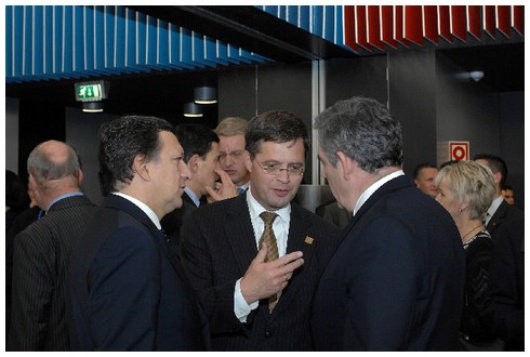No Lisbon treaty referendum for the Brits
Published on
A Europhile goes against the British PM's masquerade, as the bill has its first reading in the House of Lords on 12 March
I don’t go to London very often. But I happened to be in the UK capital the very same day that prime minister Gordon Brown won his battle in the House of Commons to not hold a referendum on the Lisbon Treaty, with a majority of 36 votes for the government. Quite the opposite to what Blair had promised in 2004 with regards to what is essentially the revamped EU constitution. It was the perfect day for the Europhile I am to bathe in the notorious British euro-scepticism. The Telegraph’s Iain Martin summarised the general mood in his comment on the 5 March EU parliamentary debate: When the entire story is told by historians, future generations will be surprised that the euro-fanatics who plotted to sell out British sovereignty and democracy avoided being sent to the tower for treason.
 British prime minister Gordon Brown, Dutch PM Jan Peter Balkenende and European commission president Durao Barroso during the Lisbon Summit in December 2007, where the Lisbon treaty was adopted. Preparing the masquerade? (Photo: European commission)
British prime minister Gordon Brown, Dutch PM Jan Peter Balkenende and European commission president Durao Barroso during the Lisbon Summit in December 2007, where the Lisbon treaty was adopted. Preparing the masquerade? (Photo: European commission)
I may be what The Telegraph’s columnist would brand a euro-fanatic - I strongly believe in a federal EU. But I cannot sympathise with the masquerade orchestrated by French president Nicolas Sarkozy, which is endorsed by Brown and the European establishment. On 26 October, Valéry Giscard d’Estaing, the former French president who chaired the convention which first drafted the European constitution, blogged that ‘one can find all the institutional proposals of the constitutional treaty’ in this Lisbon Treaty. The unanimous hypocrisy of Europhile commentators among the so-called civil society surprises me more than the double game of European leaders.
Let's agree with Iain Martin when he calls today’s European Union ‘anti-democratic’. Yet a point that he and all the other euro-sceptics miss is that it is not about the method - it is about the substance. In the twenty-first century, nation states are no more able to exercise their sovereignty as they did in the nineteenth or twentieth centuries. Political issues are increasingly globalised. Our small countries can do very little when it comes to negotiating on the world stage about – say – the environment, trade or energy with new powers like China or Russia. British commissioner Peter Mandelson, the main EU trade negotiator, knows it very well.
I believe in pan-European democracy. That is why the EU should hold a referendum on the Lisbon Treaty in all its 27 member countries at the same time, making clear that if they refuse the text they will have to quit the Union. But I also like it when politics can prove to be efficient. When democracies are powerful. To be powerful, in our times, we need a transnational player like the EU. It is not about selling out sovereignty, it is about sharing it. Gordon Brown should just explain this to his people in a referendum campaign that the British and European people deserve.



